Filter by

Individual and Collective Choice and Social Welfare Essays in Honor of Nick …
The papers in this volume explore various issues relating to theories of individual and collective choice, and theories of social welfare. The topics include individual and collective rationality, motivation and intention in economics, coercion, public goods, climate change, and voting theory. The book offers an excellent overview over latest research in these fields.
- Edition
- -
- ISBN/ISSN
- 978-3-662-46438-0
- Collation
- X, 377
- Series Title
- -
- Call Number
- 330
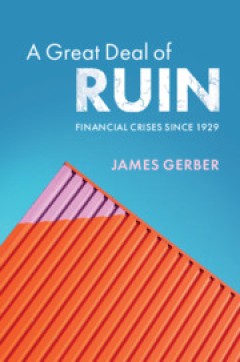
A Great Deal of Ruin Financial Crises since 1929
A Great Deal of Ruin provides an accessible introduction to the enduring problem of financial crises. Illustrated with historical analysis, case studies, and clear economic concepts, this book explains in three parts what financial crises are, how they are caused and what we can learn from them. It begins with a taxonomy of crises and a list of factors that increase the risk for countries exper…
- Edition
- -
- ISBN/ISSN
- 9781108608589
- Collation
- -
- Series Title
- -
- Call Number
- -
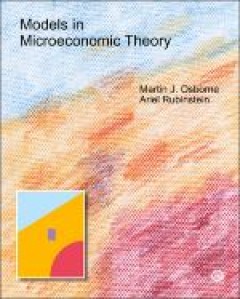
Models in Microeconomic Theory ('He' Edition)
"Models in Microeconomic Theory covers basic models in current microeconomic theory. Part I (Chapters 1-7) presents models of an economic agent, discussing abstract models of preferences, choice, and decision making under uncertainty, before turning to models of the consumer, the producer, and monopoly. Part II (Chapters 8-14) introduces the concept of equilibrium, beginning, unconventionally, …
- Edition
- -
- ISBN/ISSN
- 9781783749218
- Collation
- -
- Series Title
- -
- Call Number
- -

Rereading Marx in the Age of Digital Capitalism
The 'end of history' has not taken place. Ideological and economic crisis and the status quo of neoliberal capitalism since 2008 demand a renewed engagement with Marx. But if we are to effectively resist capitalism we must truly understand Marx: Marxism today must theorise how communication technologies, media representation and digitalisation have come to define contemporary capitalism. There …
- Edition
- -
- ISBN/ISSN
- 9781786805188
- Collation
- -
- Series Title
- -
- Call Number
- -
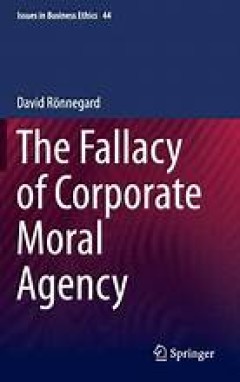
The Fallacy of Corporate Moral Agency
It is uncontroversial that corporations are legal agents that can be held legally responsible, but can corporations also be moral agents that are morally responsible? Part one of this book explicates the most prominent theories of corporate moral agency and provides a detailed debunking of why corporate moral agency is a fallacy. This implies that talk of corporate moral responsibilities, beyon…
- Edition
- 1
- ISBN/ISSN
- 978-94-017-9756-6
- Collation
- XIV, 218, 7 b/w illustrations
- Series Title
- Issues in Business Ethics
- Call Number
- -
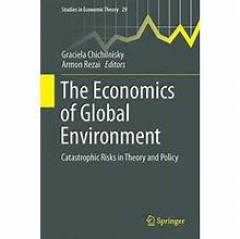
The Economics of the Global Environment
This is the first book combining research on the Global Environment, Catastrophic Risks and Economic Theory and Policy. Modern economic theory originated in the middle of the twentieth century when industrial expansion coupled with population growth led to a voracious use of natural resources and global environmental concerns. It is uncontested that, for the first time in recorded history, huma…
- Edition
- 1
- ISBN/ISSN
- 978-3-319-31943-8
- Collation
- VII, 649, 30 b/w illustrations, 46 illustrations in colour
- Series Title
- -
- Call Number
- -
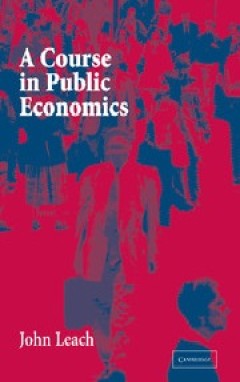
A Course in Public Economics
A Course in Public Economics, first published in 2004, explores the central questions of whether or not markets work, and if not, what is to be done about it. The first part of the textbook, designed for upper-level undergraduates and first-year graduate students, begins with an extended discussion of the two theorems of welfare economics. These theorems show that competitive markets can give r…
- Edition
- -
- ISBN/ISSN
- 9780511754180
- Collation
- -
- Series Title
- -
- Call Number
- -

A European Central Bank? Perspectives on Monetary Unification after Ten Year…
This volume, based on a conference held by the Italian Macroeconomic Policy Group and the centre for Economic Policy Research, examines the issues raised by European monetary unification. An introduction describes recent monetary developments and identifies the motivations for creating a European central bank. Theoretical papers analyse the interactions of capital controls, financial intermedia…
- Edition
- -
- ISBN/ISSN
- 9780511628504
- Collation
- -
- Series Title
- -
- Call Number
- -
 Computer Science, Information & General Works
Computer Science, Information & General Works  Philosophy & Psychology
Philosophy & Psychology  Religion
Religion  Social Sciences
Social Sciences  Language
Language  Pure Science
Pure Science  Applied Sciences
Applied Sciences  Art & Recreation
Art & Recreation  Literature
Literature  History & Geography
History & Geography